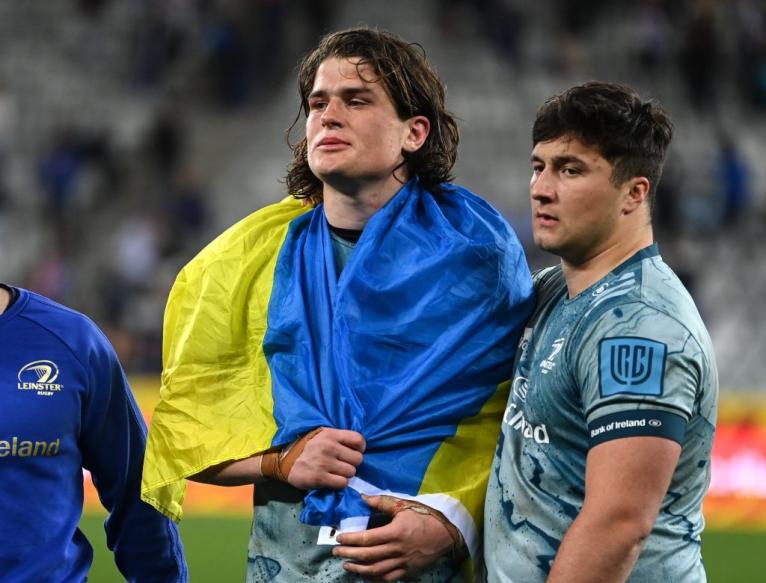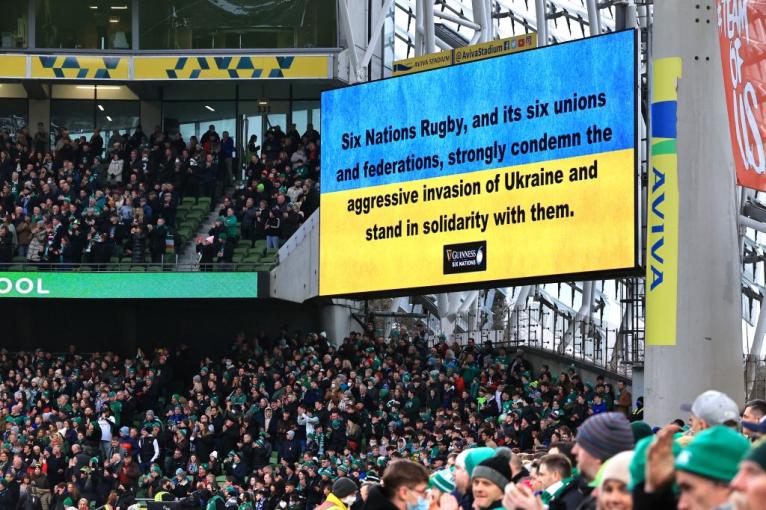On 22nd February 2022, Ukraine was invaded by Russia. A thriving country was engulfed in a war which has lasted last two years, stalling, at first, all of their social, economic, and sports progress. Ukrainian rugby was no different; the game forced into indefinite suspension. Some players were killed, others forced to flee. Pitches, facilities and stadia were destroyed by missiles, plunging everyone into a murky and doubtful future.
But, like their national plant, the sunflower, those driving Ukrainian rugby have found their way out of the rubble. What seemed improbable, ultimately became a story of overcoming hardship and sending a clear message they are willing to keep fighting for a brighter tomorrow.
Iryna Arkhytska, the Ukraine Rugby Union’s general manager, explains how she believes in better days.
A match was held in Lviv for the third time in memory of long-time Sokol player Hleb Borovikov and the fallen Heroes of the Ukrainian Armed Forces pic.twitter.com/YtyACgt93S
— Ukrainian Rugby (@RugbyUkraine) January 15, 2024
“Officially, since the start of the invasion and war, none of our rugby clubs have closed, as most think this situation will be over sooner or later, which might sound strange,” Arkhystka tells RugbyPass.
“Obviously, our club activity suffered, mainly in the youth categories, as we had to delay and/or cancel competitions for a while. We have gone through a period of adaptation – for example, we cancelled our male senior Premiership in the first year of the invasion, but have resumed it since 2023. The safety of our players is paramount, and we have strict instructions when there’s a possible incoming attack, we have to go to the shelter. We have learned to adapt and live with this abnormal time of our lives.”
Ukrainian rugby was enjoying unprecedented growth before the invasion, and had to be creative simply to continue running its competitions. RC Olymp, one of the country’s most famous clubs, is based in the heavily bombarded city of Kharkiv. It was where the national XVs and sevens squads held training camps before rugby ground to a halt.
“Thankfully, in 2024, a group of former players picked up the pieces and combined Olymp with another club, creating a Kharkiv team that represents the whole region,” Arkhytska says. “Their effort is inspiring, as Kharkiv has been targeted every day since the beginning of the war, with much of its infrastructure destroyed.
“Even with all that sorrow, they managed to train, and prepare a team to play in the Ukrainian Championship, which is going to be held in June. Kharkiv was a mighty centre for Ukrainian rugby, as it prepared referees, had incredible youth and senior events, and it was producing a lot of players for our future. So, for them, to overcome those obstacles and still find a way to play, is inspiring.”

Remarkably, all 43 clubs in existence before the COVID-19 pandemic and the Russian onslaught remain active. National XVs and sevens captain Vadym Sivak found rugby a source of strength amid the turmoil and terror.
“The first few months no one understood what was going to happen in our country,” he says. “Our rugby community, like everything else, was stalled. After some time, we managed to play just for ourselves in my home club Podilla, and it reminded us rugby will always be here for us, even when war is going on in our country.”
The women’s sevens side seized their opportunities, winning the European Trophy Series last July, skippered by long-serving captain Nataliia Mazur, who has spent over a decade representing her nation.
“First of all, I think it’s our love of rugby and the desire to defend the honour of our country with dignity,” Mazur says, when asked how her players kept going. “We are proud of each other and we feel we are as one. I’m extremely proud to have been able to represent and defend my country.”
Arkhytska talks about the players in glowing terms, as the men’s side finished second in the Rugby Europe Trophy before succumbing to relegation earlier this year. The Trophy sits below the Championship which features such emerging powers as Georgia and Portugal.
It would be unfair and dangerous to bring any team to play a game in Ukraine at the moment. We can’t put our adversaries and friends in danger.
“It isn’t easy to ask players to leave their families behind to go to a training camp outside of Ukraine and travel back and forth while worrying about the security of their families,” she stresses. “Even so, they were able to finish in second in the Trophy in 2023, and earned a promotion in the men’s and women’s Rugby Europe Trophy Sevens Series, which should tell you the amount of love they have for Ukraine and rugby.”
Ukraine hasn’t hosted a match since 2022, playing their home games in Croatia or Czechia, countries which welcomed their neighbors with open arms, as noted by Arkhytska.
“It would be unfair and dangerous to bring any team to play a game in Ukraine at the moment. We can’t put our adversaries and friends in danger.”
Even away from home soil, Ukraine battled to avoid relegation in the Rugby Europe Trophy last year and this. Their international players refused to give up. For Sivak, wearing the blue and yellow shirt means everything.
“I’m sure every sportsman feels the same: goosebumps. I always shed tears when the anthem starts, because I know our soldiers are fighting for us. It inspires me and my teammates to play better, and work hard for them because they deserve our respect.”
But there is good news coming for Ukrainian rugby, as part of the infrastructure lost by the missile attacks has been recovered, including the Dynamo Stadium in Kharkiv, with an increase in public and private funding for more and better facilities.

“Our Ministry of Sports has doubled their investment in our union, and since 2024 we have five national teams fully funded: the men’s XV and sevens, the women’s sevens and the Under-18s boys and girls,” Arkhytska says. “Inflation and the war have limited their growth, and for now, we can’t have a women’s XV because it would go over budget. It’s a complicated situation, but we are trying to find solutions. New Zealand has helped us for example, and has brought some ideas we wish to work on in the near future.”
Ukraine has lost 500 licensed players in the last two years, downsizing their player base by 30%. Although most of those players were impossible to retain, some were forced to stand down from representing Ukraine due to a piece of wartime legislation.
“Men between 18 and 65 years old have to go to a military centre to update their data and be ready to be conscripted into the army,” Arkhytska explains. “Not every person was born to be a soldier, and some of our registered players choose to not show up, as if they play for the national team they will be exposed and forced to enrol.
“We have asked the Ministry of Defence to create an exception for these young players to be able to go abroad, and, if called by the national Ukrainian team, not be forced to go to the army when they land here. They deserve the chance to become professional players. We understand the war effort, however, we have good players who can bring glory to Ukraine by playing for their country.”
Even with all difficulties, obstacles, issues, sadness, and stress, the rugby community worldwide needs to understand we won’t give up.
Tragically, the war has claimed its share of rugby lives.
“Some players from our Ukrainian championship are gone,” Sivak says. “It’s terrible to accept it. A few days ago, a player from Kyiv RC Antares, Volodymyr Yavorskiy, left us, and I just can’t accept it. We have lost so many, and it is because of the f*****g war. Sorry for the cursing but I have no words for how revolting it is.”
Amid all the doubts, questions, and worries, the Ukrainian Rugby Union has found new paths to help push the sport forwards. Festivals and seminars have been held, with rugby introduced to many schools across the country, and teachers requesting more equipment to handle the rise in interest.
“It has become a very popular project all over the country, and we have been able to set a competition between schools which we hope will spark something special for us,” Arkhytska says.
“Rugby is seen as a complete sport, in the sense it helps you grow mentally and physically, teaching important lessons about working as a group. It is attractive for children, and I think our prospects for the future are immense.
“We know how important it is to keep Ukrainian rugby alive, and I hope people understand the amount of people passionate and in love with it in our country. Even with all difficulties, obstacles, issues, sadness, and stress, the rugby community worldwide needs to understand we won’t give up.”
Asked to give messages to the wider rugby people, the two players, Sivak and Mazur, share a yearning for an end to the violence and destruction.
“The only thing I want to say is to thank everyone who has been helping and supporting Ukraine,” Sivak proclaims. “We are truly appreciating it. I wish only peace and a happy life, no war on our planet!”
Mazur adds: “I just want only one thing for every Ukrainian: a peaceful blue sky for our Ukraine!”


A peaceful blue sky is not much to ask for. I hope the rest of the world can help Ukraine with its goal. We here in nz we are gobsmacked at the relentless barbaric assault on innocent like minded people.
You obviously don’t know anything about the war if you think k Ukraine is innocent 2014 for 8 years before the invasion Ukrainian puppet government put in by the usas coup they bombed Russian speaking people killing 150000 people so they no where near innocent they just play innocent because it’s Russia